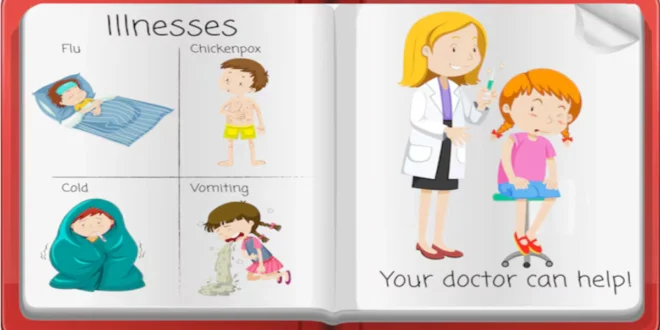Health Vocabulary Simplified: Your Guide to Mastering Medical and Wellness Terms
In today’s fast-paced world, understanding health vocabulary is no longer optional—it’s essential. Whether you’re reading a prescription label, discussing symptoms with a doctor, or simply learning about nutrition, being familiar with health-related terms can make a profound difference. Health literacy, defined as the ability to obtain, process, and understand basic health information, is crucial for making informed decisions about your well-being.
This article delves deep into the realm of health vocabulary, breaking it down into accessible categories, providing practical tips, and emphasizing its importance for personal and societal health. By the end of this article, you’ll be equipped with not only an enriched health vocabulary but also the confidence to navigate the often-intimidating world of health and wellness terminology.
What is Health Vocabulary?
Health vocabulary encompasses the words, terms, and phrases used in the field of health, medicine, and wellness. It ranges from basic words like “symptom” or “fever” to more specialized terms like “hypertension” or “myocardial infarction.”
Understanding health vocabulary helps bridge the gap between medical professionals and individuals. It ensures that communication about treatments, diagnoses, and preventative measures is clear and effective.
Examples of Health Vocabulary in Everyday Life:
- General terms: Fever, fatigue, pain, swelling.
- Medical conditions: Diabetes, asthma, arthritis.
- Procedures: X-ray, biopsy, vaccination.
- Preventative care: Screening, immunization, hygiene.
Health vocabulary isn’t just for professionals—it’s for everyone who values their well-being.
Key Areas of Health Vocabulary
Health vocabulary can be grouped into distinct categories, each relevant to specific aspects of health care and wellness. Here’s a breakdown of the key areas:
1. General Health and Wellness Terms
These are the foundational terms that people encounter daily. They often describe common symptoms, general conditions, or basic health activities.
- Symptom: A physical or mental feature indicating a condition.
- Diagnosis: Identification of an illness based on symptoms and tests.
- Treatment: Medical care given to manage or cure a disease.
- Wellness: The state of being healthy in mind and body.
2. Medical and Clinical Terms
These terms are more specific and used in clinical settings. They describe medical conditions, procedures, or tests.
- Hypertension: High blood pressure.
- Biopsy: A procedure where tissue is removed for examination.
- Antibiotics: Medications used to treat bacterial infections.
3. Anatomy and Physiology
Understanding the human body and how it functions is crucial for interpreting health information.
- Cardiovascular: Related to the heart and blood vessels.
- Gastrointestinal: Pertaining to the stomach and intestines.
- Neurology: The study of the nervous system.
4. Nutrition and Diet-Related Terms
Health vocabulary often includes terms related to food, diet, and nutrition, as they are fundamental to overall health.
- Calorie: A unit of energy obtained from food.
- Macronutrients: Essential nutrients like carbohydrates, proteins, and fats.
- Metabolism: The process by which your body converts food into energy.
5. Mental Health Vocabulary
As mental health awareness grows, understanding its vocabulary becomes increasingly important.
- Anxiety: A feeling of worry or fear.
- Depression: A persistent feeling of sadness or loss of interest.
- Therapy: Treatment intended to relieve or heal a disorder.
6. Disease Prevention and Treatment Terminology
Words in this category help people understand how to maintain their health and prevent illnesses.
- Immunization: The process of becoming immune to a disease, often through vaccination.
- Screening: Testing for diseases before symptoms occur.
- Lifestyle modification: Changes in habits to improve health.
Everyday Health Vocabulary
Even in daily conversations, health-related words frequently pop up. Knowing their meanings can help in simple situations, like visiting a pharmacy or reading a product label.
Common Words and Phrases:
- Over-the-counter (OTC): Medications available without a prescription.
- Dosage: The amount of medicine prescribed.
- Side effects: Unintended reactions to a drug or treatment.
For instance, when your pharmacist says, “This medication may cause drowsiness,” understanding “drowsiness” as extreme tiredness helps you prepare accordingly.
Advanced Health Terminology
Sometimes, health-related conversations or research dive into advanced medical jargon. While intimidating, these terms are essential in certain scenarios, like discussing a detailed diagnosis or treatment plan with a specialist.
Examples of Advanced Health Terms:
- Prognosis: The likely course or outcome of a disease.
- Chronic: A condition that is long-lasting or recurrent.
- Pathology: The study of disease causes and effects.
While these terms are typically used by professionals, learning them can empower you to ask the right questions and fully understand your health journey.
Learning Health Vocabulary
Expanding your health vocabulary doesn’t have to be overwhelming. Here are practical steps to improve your understanding:
1. Use Context Clues
When encountering a new term, pay attention to the surrounding words. For example, “antibiotic” often appears alongside infections, giving you a hint about its purpose.
2. Break Down Words
Many health terms come from Greek or Latin roots. Understanding common prefixes, suffixes, and root words can clarify meanings. For example:
- Cardio- (heart) + -vascular (vessels) = related to the heart and blood vessels.
3. Leverage Technology
Apps like Medscape and websites like Mayo Clinic offer easy access to definitions and explanations of medical terms.
4. Engage in Conversations
Ask questions during doctor visits or when discussing health topics. Most professionals are happy to explain terms in simpler language.
5. Practice with Word Lists
Create flashcards with terms and their meanings. Review them regularly to build confidence.
Commonly Misunderstood Health Terms
Some health vocabulary is prone to misunderstanding, leading to confusion or miscommunication.
Examples:
- Infection vs. Inflammation: An infection is caused by microorganisms, while inflammation is the body’s response to an injury or infection.
- Flu vs. Cold: Both are respiratory illnesses, but the flu is typically more severe.
- Antibiotics vs. Antivirals: Antibiotics treat bacterial infections, whereas antivirals target viruses.
Clarifying these terms ensures accurate discussions about symptoms, treatments, and prevention.
Why Health Vocabulary Matters
Understanding health vocabulary has tangible benefits, from improving personal health to contributing to public health efforts.
1. Empowering Conversations
Knowing the right terms allows you to engage confidently with healthcare providers, ensuring your concerns are understood and addressed.
2. Making Informed Decisions
Whether deciding on a treatment plan or understanding a food label, health literacy supports smarter, healthier choices.
3. Enhancing Public Health
Widespread health literacy can lead to better community health outcomes, as people become proactive about prevention and care.
Practical Exercises
Here are some exercises to build your health vocabulary:
1. Match the Term with Its Meaning
- Hypertension: _______ (a) High blood pressure.
- Metabolism: _______ (b) Body’s process of converting food to energy.
2. Contextual Sentences
Fill in the blanks with appropriate terms:
- The doctor recommended _______ to prevent the flu. (Immunization)
- Chronic _______ can lead to joint damage over time. (Inflammation)
3. Word Expansion
Choose a body system (e.g., cardiovascular) and list associated terms like “heart,” “artery,” and “pulse.” Look up unfamiliar words for added learning.
Conclusion
Mastering health vocabulary is not just about sounding informed—it’s about gaining the tools to take charge of your health. From deciphering a prescription label to understanding a medical diagnosis, knowing the right words can be empowering and even life-saving.
As you continue on your journey to health literacy, remember that knowledge is your greatest ally. Make a habit of learning new terms, asking questions, and seeking clarity. Health vocabulary is the bridge between confusion and confidence, and it’s never too late to start building it.
Frequently Asked Questions (FAQs)
Why is it important to understand medical terms?
Understanding medical terms helps you communicate effectively with healthcare providers, understand your diagnoses and treatment options, and make informed decisions about your health. It also reduces confusion when reading prescription labels or health-related documents.
What is the easiest way to learn health-related words?
Start by familiarizing yourself with commonly used terms in everyday health conversations, such as symptoms, medications, and body parts. Using apps, flashcards, and medical dictionaries can simplify the process. Breaking complex terms into prefixes, roots, and suffixes also helps.
Can understanding health vocabulary improve my well-being?
Yes, understanding health vocabulary empowers you to take control of your health by enabling clear communication with professionals, understanding preventative measures, and following medical instructions accurately. It can lead to better outcomes and reduced stress.
Are medical terms the same worldwide?
While many medical terms are universally recognized due to their Latin and Greek origins, some terms may differ slightly depending on the country or healthcare system. However, the foundational vocabulary remains consistent across languages and regions.
What resources are best for expanding health vocabulary?
Reliable resources include online platforms like the Mayo Clinic or MedlinePlus, health-focused mobile apps, anatomy textbooks, and even YouTube videos explaining medical concepts in simple terms. Conversations with healthcare providers can also enhance your understanding.
How can I explain health terms to others without confusing them?
When explaining health terms to others, use simple language and avoid jargon. Break down complex words into understandable parts, and provide examples or analogies to clarify meanings. For instance, instead of saying “hypertension,” you could explain it as “consistently high blood pressure.”
READ ALSO: Dogs is Dogs: Why They’re Our Lovable Little Rascals
 Touch Blog
Touch Blog



